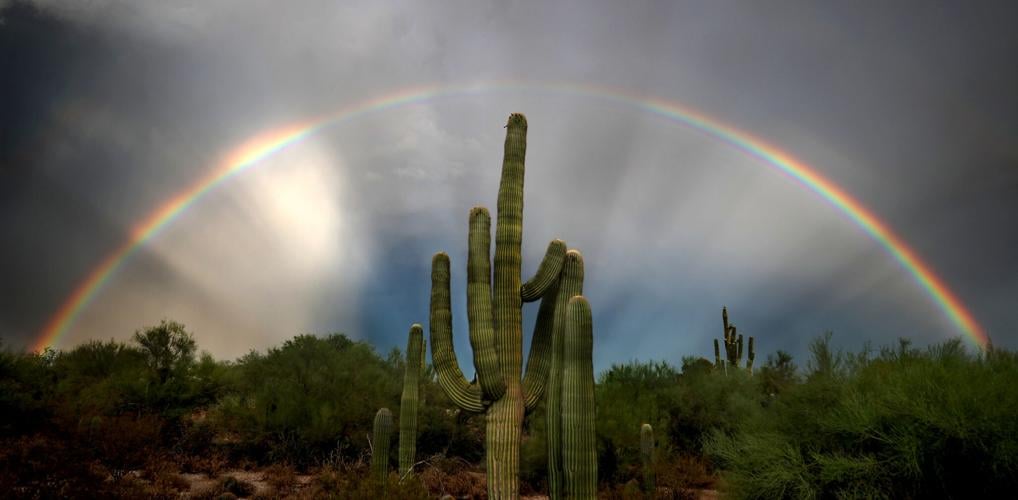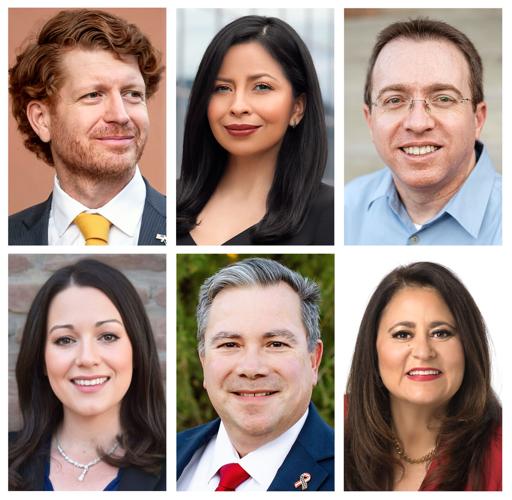Tucson and Phoenix experienced record-breaking and record-tying heat throughout the summer of 2024.
Both cities’ average summertime daily temperatures have jumped 4 to 5 degrees monthly since 1970.
Both cities also had dozens of days this past summer in which climate change had strong impacts on their temperatures, research by the nonprofit group Climate Central found.
And hundreds of Phoenix-area residents and dozens of Tucson-area residents are now dying each year due to heat-related illness.
The Democratic candidates for Arizona Corporation Commission made climate change an issue, but it did them no good in this year’s election.
Not only did Republican candidates sweep the three commission races, giving the GOP a 5-0 margin on the panel, the results weren’t close.
While the three Democratic candidates advocated pushing the commission away from authorizing more fossil fuel plants, those arguments clearly didn’t sway enough voters.
The commission has a great deal of say over what kinds of energy will be produced and sold to consumers. Also, the kind of energy people use to electrify, heat and cool their homes and businesses makes a difference in how much climate-heating greenhouse gas emissions go into the atmosphere.

Arizona Corporation Commission candidates: Top row: Joshua Polacheck (D), left, Ylenia Aguilar (D), middle, and Jonathon Hill (D). Bottom row: Rachel Walden (R), left, Rene Lopez (R), middle, and Lea Marquez Peterson (R). The three Republicans swept the races.
Why didn’t climate change resonate as a major election issue?
Independent observers, candidates from both parties and environmental activists cited the following reasons, with disagreements arising about the importance of each one:
— Donald Trump’s decisive statewide victory over Democrat Kamala Harris.
— Environmentalists’ difficulty in selling climate change as an issue.
— A drop-off in votes for Democrats in general from their much more successful election efforts here in 2020 and 2022.
— A strong effort by Republican candidates to reach out and connect with voters all over the state, in rural as well as urban areas — an effort that Democrats said they also made.
— A lack of knowledge among the general public about what the Corporation Commission does, more than a century after framers of the Arizona Constitution established it as an agency “independent of the Legislature, the Executive or the Judiciary,” as the commission puts it on its website.
An undisputed point is that climate change didn’t rank high among voter priorities. Overall, Phoenix pollster Mike Noble said his company’s polling this fall found about 6% of registered voters who responded had climate as their top issue, and 16% had it among their top three issues.
“When you look at the pecking order, inflation was number 1, immigration was number 2, affordable housing was number 3 and abortion was number 4,” said Noble, of Noble Predictive Insights. While those issues plus health care scored with at least 21% of respondents, “everything else was in the teens or lower.”
Here are more specifics:
— A red year. Trump carried Arizona by more than 185,000 votes, including a 71,000-vote margin in Maricopa County. Harris carried much smaller Pima County by about 77,000 votes. The lowest vote-getter among Republicans in the Corporation Commission race finished more than 100,000 votes ahead of the top vote-getting Democrat. Republicans also fared very well in both congressional and legislative races this year, indicating Trump had coattails.
Also, Harris got about 6% fewer votes this year than Biden received in 2020, whereas Trump received about 3.5% more votes this year than in 2020.
“It seems to me there is a red wave. Except for (unsuccessful Republican Senate candidate) Kari Lake, who is uniquely unpopular, they voted straight down the ballot for Republicans,” said Autumn Johnson, director of the Arizona Solar Industries Association, which advocates for renewable energy.
“The three Democratic candidates (for ACC) were kind of hostage to the top of ticket, which is heading toward Republicans,” Noble said the day after the Nov. 5 election.

Tucson and Phoenix had dozens of days this past summer in which climate change had strong impacts on their hot temperatures, research by the nonprofit group Climate Central found.
All down-ballot races, particularly in a presidential election cycle, “seem to succumb to the tribal mentalities that govern our politics. You’re either team red or team blue,” said Chuck Coughlin, a longtime Phoenix political consultant and a Republican-turned-independent. This time, “team red won.”
Republican commission winner Rene Lopez disagreed, noting the coattail effect didn’t work in 2020 or 2022, when Republicans won two of three and two of two commission races respectively, despite many Democratic successes both years.
“Even in 2022, a heavy Democratic year, we still unseated an incumbent Democrat (former Commissioner Sandra Kennedy),” Lopez said. “We ran our races on our own merits. We didn’t throw out high-level endorsements. The Corporation Commission seems to be an independent entity.”
Incumbent Commissioner Lea Marquez Peterson of Tucson, however, said the work of the state GOP and that of specific campaigns such as Trump’s certainly influenced more Republicans and independents to vote, “which helped our campaign.” She was one of the three victorious Republican candidates.
“The Republican Party was very organized and created strong systems to encourage precinct committeemen and legislative district leaders to reach out to ‘low propensity’ Republican voters in the primary and the general. I’ve run before and was very impressed with the organizational structure of the effort and the work by the AZGOP,” she said.
— Lack of voter awareness. It’s a common perception among many observers and participants in this race that generally, voters don’t know much about what the commission does, including its importance in shaping energy policy.
“There isn’t a tremendous amount of voter awareness on what its role is beyond the issue of rate-setting” for utilities, Coughlin said.
“It’s very much viewed as an administrative body, almost quasi judicial, not highly politicized. When you bring up the issue of climate change and renewables, you inject a political narrative into what otherwise is a routine rate setting process,” he said.
In going door-to-door and in other interactions with voters across the state, Democratic commission candidate Jonathon Hill said, “The vast, vast majority of people I talked with really had no idea what the commission did.
“Many people admitted they’ve seen it on their ballot but they don’t vote for it, they don’t know where it is,” Hill said. “A huge part of this race is education.”
Between them, Trump and Harris gained at least 400,000 more votes than the two leading Democratic and Republican commission candidates won. That “absolutely” made a difference, Hill said.
Sierra Club leader Sandy Bahr agreed climate change wasn’t a big issue in this election, since she heard virtually no discussion about it among major statewide candidates.
Plus, she said there was considerable misinformation put out about renewable energy by some commissioners. “We know solar is cheaper than fossil fuels. But people on the commission tend to push out ‘it’s so expensive and not a good investment’,” said Bahr.
“People were probably exposed to nothing about the ACC,” said Bahr, director of the Sierra Club’s Grand Canyon chapter. “One of the problems is the name of it. You wouldn’t even know from the name that they’re regulating utilities or how much impact they have on our electric bills.”
You typically see drop-offs in voter interest as you go down the ballot and people are more likely to vote party for races they are not as interested in, said Johnson, of the Arizona Soler Energy Industries Association.
Marquez Peterson disagreed that the public isn’t very aware of the commission’s responsibilities, saying, “I believe voters are more informed and smarter than given credit for and it is why they rejected the policies of our opponents in this election.
“As a commissioner, it has been a priority for me to educate the public and I plan to continue to speak to groups and organizations about the future of energy, economic development, and the importance of reliability and affordability in energy and water across the state,” she said. “Several of the commissioners, including me, send out monthly newsletters discussing our votes and issues before the commission.
“In the past, I have also created ‘Chairwoman Chat’ videos in a two-minute format describing our work and recent votes and distributed them on social media and Youtube,” she said.
— Climate change backlash or lack of voter interest. Republican Lopez said he saw backlash mainly in rural counties, where Republicans got their largest percentages of votes.
“The Democratic schtick was to push renewables and to close coal and natural gas plants,” he said. “When you’re heavily in rural communities, their incomes and livelihoods depend on that. Rural electric co-ops heavily depend on that. By Democrats running on that kind of schtick, it further alienated their message from rural communities.”
Democratic candidate Joshua Polacheck said it’s not true that Democrats were pushing to close gas plants.
He blamed his defeat on what he called his inability to break through “information silos” that use the news to push a partisan line, such as Fox News, OAN and Epoch Times. Most voters he encountered had no idea the Republican-controlled commission has approved “millions in (utility) rate increases,” he said.
But Johnson and Bahr agreed climate change wasn’t a priority issue for a lot of voters and Bahr said environmentalists and others need to do more to drive home with voters how the commission influences clean energy and electric rates.
Climate “was barely mentioned in any debates, let alone the ACC debate,” Johnson said.
Bahr said to some degree, climate change’s inability to draw a lot of voter interest was a self-fulfilling prophecy.
“When you have people spending millions and millions of dollars to talk about the border and inflation and transgender rights, not that those weren’t important issues, it’s just not going to come up as an issue,” she said.
“So we need to figure out a better way to make it more of an issue. We still have so much work to do to inform people about what the ACC does and how it affects electric bills, clean energy, and the climate. We are up against fossil fuel dollars, monopoly utility dollars, and now the crypto industry, so the challenge is great.”
Coughlin said, “My experience has been that when you use the (phrase) climate change, you are injecting yourself into the national political debate.
“Republicans don’t buy the term climate change. You use that term with Republicans, you run into a rhetorical wall. They buy drought, but climate change becomes a much more loaded phrase in a political narrative.”





